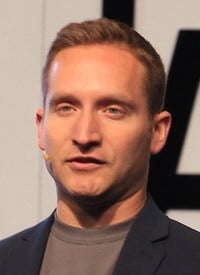Tuesday, November 24, 2015
DoorStat: Using Vision Recognition To Improve Business Analytics

Many businesses--particularly in sports, entertainment, and retail--don't have a very good idea of the demographics of their clientele. How can you get a better handle of who your customers are, by using technology? Los Angeles-based DoorStat (www.doorstat.com)--which recently moved here from Chicago—tells us about how it is using vision recognition software to help businesses, such as entertainment venues, better understand who their customers are. We talked with Cole Harper, CEO of the company.
What does Doorstat do?

Cole Harper: We have automated technology that can determine the demographic sentiment of people, using video based software. It's all anonymous.
How does that work?
Cole Harper: We have a database of anonymized faces, where we are trying to match what type of people we see in the real world to that database. That software determines, anonymously, gender, age, ethnicity, as well as the mood of each person. We don't store any images or video, just the raw data. It's all turned into business intelligence and reports, to help businesses with marketing, operations, brand relationships, and ultimately, to make money.
What problem are you solving for your customers?
Cole Harper: The big problem is that a lot of businesses don't know who their real customers are. They have things like point of sale data, which can be misleading or incomplete. They're using surveys, which become outdated really quickly, or which cover too small of a sample size. At the end of the day, every one wants to know their true customers. We're making it so that every person who walks into an area of interest can be turned into information, which can be used to make more money.
How did you get into this?
Cole Harper: We actually started this a few years ago in Chicago, trying to figure out the best bars to go to. We were talking about how there was no technology which could tell you, in real time, how full a place is, and the male female ratio. The more we looked into it, the bigger we found the opportunity, and as we looked further, we found that businesses, not consumers, could leverage this even more than anyone else, so we created a B2B market around this.
What's your background?
Cole Harper: My background is finance. I got into technology after working at Accenture for a few years.
How did you guys end up here in LA?
Cole Harper: We learned about the Dodger Accelerator opportunity, because they focused on sports, which is where most of our clients are from, plus the marketing and branding of R/GA. They accepted us, and within the first six weeks we saw the power of their network, and decided to make LA our headquarters, and actually moved from Chicago to Los Angeles. It's a great backyard to not only grow in sports, but in entertainment, and ultimately retail and real estate.
< Where is your product now in terms of availability?
Cole Harper: It's available now. We launched about a year ago, starting with a lot of motor sports clients. We are now getting into some real estate groups, retailers, movie theaters, and activations for brands. Anyone who thinks they might want to use our technology, we're happy to work out a pilot program, and we can get some real data in their hands.
Thanks!